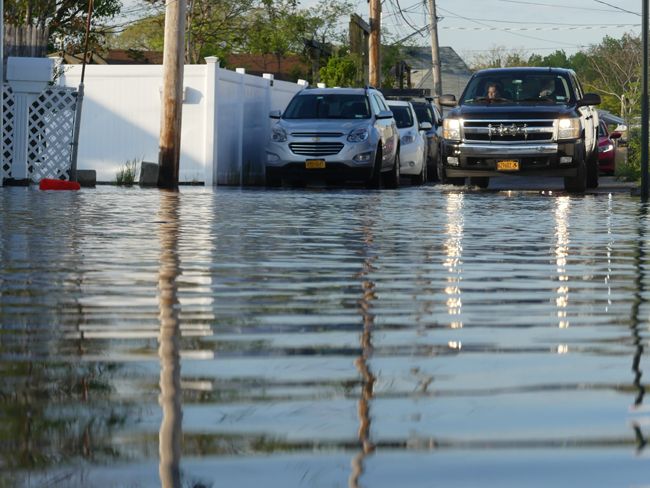
Tidal flooding, also called sunny day flooding, in Jamaica Bay, New York. Credit: Ryan Strother/New York Sea Grant.
— Published for Patch.com's Brooklyn site
NYSG's Coastal Resilience Specialist Katie Graziano works w/ NYC Mayor's Office of Resilience, Science & Resilience Institute at Jamaica Bay
Brooklyn, NY, October 29, 2020 - The latest episode of Cornell Cooperative Extension (CCE)'s "Extension Out Loud" podcast explores a community science project aimed at mitigating the impacts of flooding in Jamaica Bay, NY.
This watershed is a heavily urbanized, densely populated and ecologically critical 18,000-acre wetland estuary surrounded by the Rockaway Peninsula to the South, Brooklyn to the West, and Queens to the East.
Residents of coastal neighborhoods located in the Jamaica Bay region are experiencing tidal flooding at increasing frequency—as often as twice a month. Tidal flooding is also called sunny-day flooding because it can occur in any weather, causing disruptions in the daily lives of residents.
With the Community Flood Watch project, a community science-driven initiative in collaboration with NYC Mayor's Office of Resilience and the Science and Resilience Institute at Jamaica Bay, residents engage in data collection and decision making about flood mitigation measures. The project enables local lawmakers and researchers to work together with residents to design a more resilient community informed by local knowledge.
"What's important about Flood Watch is that it gives people the tools to make the decisions that are important to them," says Katie Graziano, Coastal Resilience Specialist with New York Sea Grant (NYSG). Graziano, who came to NYSG this past summer, works in collaboration with SRIJB, which is located on the Brooklyn College campus.
In this episode of the "Extension Out Loud" podcast, Graziano and Paul C. Focazio, NYSG's communications manager, discuss the development and vision of the Flood Watch project.
For more on the Community Flood Watch Project, see SRIJB or NYSG's Web sites.
More Info: New York Sea Grant and SRIatJB
The Science and Resilience Institute @ Jamaica Bay
(SRIJB) is a research center focused on enhancing environmental,
social, and economic resilience in communities of Jamaica Bay funded by
the Rockefeller Foundation and the City of New York.
New York Sea Grant (NYSG), a cooperative program of Cornell University
and the State University of New York (SUNY), is one of 34 university-based
programs under the National Oceanic and Atmospheric Administration’s
National Sea Grant College Program.
Since 1971, NYSG has represented a statewide network of integrated
research, education and extension services promoting coastal community
economic vitality, environmental sustainability and citizen awareness
and understanding about the State’s marine and Great Lakes resources.
Through NYSG’s efforts, the combined talents of university scientists
and extension specialists help develop and transfer science-based
information to many coastal user groups—businesses and industries,
federal, state and local government decision-makers and agency managers,
educators, the media and the interested public.
The program maintains Great Lakes offices at Cornell University, University at Buffalo, SUNY Oswego and the Wayne County Cooperative Extension office
in Newark. In the State's marine waters, NYSG has offices at Stony Brook
University in Long Island, Brooklyn College and Cornell Cooperative
Extension in NYC and Kingston in the Hudson Valley.
For updates on Sea Grant activities: www.nyseagrant.org has RSS, Facebook, Twitter, Instagram, and YouTube links. NYSG offers a free e-list sign up via www.nyseagrant.org/nycoastlines for its flagship publication, NY Coastlines/Currents, which is published quarterly. Our program also produces an occasional e-newsletter,"NOAA Sea Grant's Social Media Review," via its blog, www.nyseagrant.org/blog.